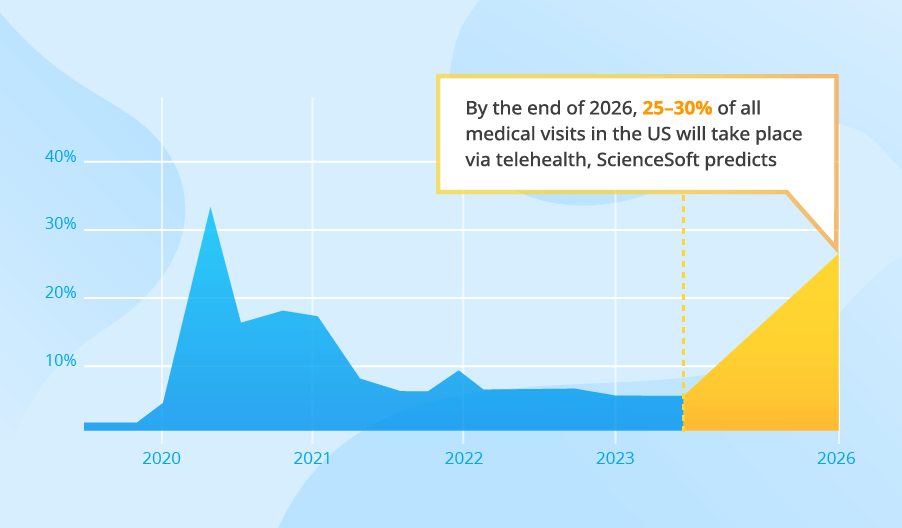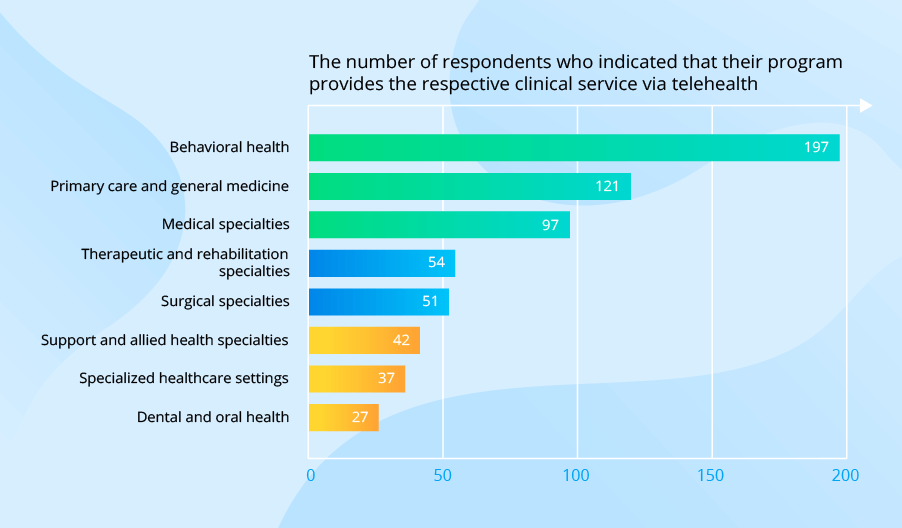Custom Virtual Hospital
A Practical Guide
In healthcare IT since 2005, ScienceSoft designs and develops efficient virtual hospital solutions to help healthcare providers shift towards remote patient care.
The Essence of a Virtual Hospital
For medical providers, a virtual hospital solution is a way to improve outcomes of high-risk patients remotely while decreasing care expenses. Virtual hospital solutions leverage telehealth for audiovisual communication and messaging, the Internet of Things to access data from connected medical devices, AI for disease patterns identification, and more. Custom virtual hospital software is particularly valuable as it can be tailored to the unique needs and workflows of your healthcare organization, resulting in enhanced patient care and streamlined operations.
In this guide, ScienceSoft shares insights on virtual hospital solution composition, success factors, and average investments to help you with risk-free software implementation.
The Architecture Powering a Virtual Hospital

Key elements of a virtual hospital solution:
- A patient app – to schedule and visit virtual appointments, message doctors/nurses to consult about the symptoms, track health state (e.g., vitals and symptoms) and medication intake, view treatment plans, request medication refills, etc. The app can also be used by a patient’s caregiver (e.g., a relative) to help better coordinate the care.
- An app for the virtual hospital care team (e.g., nurses, general physicians, cardiologists, physical therapists) – to provide online patient consultations, examinations, suggest treatment changes, access and evaluate patients’ vitals, tests results, medical images, manage patients’ medication, etc.
- A video streaming server for real-time audiovisual communication between patients and the virtual hospital care team.
- A cloud data storage and processing module for storage of PHIs, consultation recordings, etc., and analysis of patient information (e.g., device-generated data, treatment plans).
- An admin web panel (for virtual hospital administrators, etc.) – to manage user access to virtual hospital software, view the list of patients, etc.
The implementation of a virtual hospital is especially suitable for chronic diseases, rehabilitation, and mental health divisions, as they generally don’t require urgent medical attention. Using virtual hospital software, the healthcare organization can distribute the workload of doctors and nurses and allow them to monitor more patients at the same time.
Must-Have Functionality for a Virtual Hospital Solution
ScienceSoft’s healthcare IT experts tailor the functionality set to the business needs of each client. Below, we outline the virtual hospital features often requested by healthcare organizations we work with.
Wonder How to Launch a Successful Virtual Hospital?
Being ISO 13485 certified to create medical software according to the requirements of the FDA, the Council of the European Union, the UAE's Ministry of Health and Prevention, ScienceSoft can design and implement a tailored virtual hospital solution to help you benefit from hospitalizations reduction, care costs decrease, and staff workload alleviation.
Vital Integrations for a Holistic Patient Care

ScienceSoft’s experts recommend integrating virtual hospital software with all relevant healthcare IT systems to ensure access to cohesive and comprehensive patient information across all apps. Here are the most common integrations for a virtual hospital:
- Smart medical devices for patients to capture real-time data on vitals, medication intake, etc., and share it with a care team for disease monitoring.
- EHR/EMR to provide immediate access to a patient’s medical history, chronic conditions, allergies, and contact information for the virtual hospital care team, etc.
- Practice management system to facilitate patient’s access to the healthcare specialists’ schedules, automate patient billing data entering to the system, etc.
- Medical imaging software and a laboratory information system to enable an instant view of a patient’s X-rays, CT scans, etc., and lab test results for the care team to decide on treatment adjustment, patient readmission to a hospital, etc.
Key Steps to Developing a Virtual Hospital
Creating a custom virtual hospital is crucial for improved patient care, streamlined administration, and resource optimization. Since 2005 in healthcare IT, ScienceSoft is well-equipped to deliver effective and innovative virtual hospital software. The development journey involves several key steps:
1
Analyzing your specific requirements and identifying essential features, such as telehealth, appointment scheduling, and remote patient monitoring.
2
Designing a scalable architecture: planning techs for safe patient data storage and real-time collaboration; designing integrations with existing hospital systems.
3
Designing UX/UI for patient and care team apps with a focus on accessibility, functionality, and ease of navigation.
4
Developing the user and server sides of a feature-rich virtual hospital: building telehealth modules, patient monitoring and appointment scheduling tools; ensuring seamless integration with medical devices (e.g., portable ECG and X-ray machines, infusion pumps, telemedicine kits).
5
Testing the solution (planning test automation, if feasible) focusing on quality, security, and regulatory compliance.
6
Deploying the virtual hospital, providing comprehensive support and maintenance services for continuous system availability and reliability.
Consider Investing in a Virtual Hospital?
According to Deloitte, 60% of surveyed large health systems plan additional investments into virtual care. Virtual hospitals enable patients to actively engage in managing their health, and bring benefits like increased efficiency of medical staff, reduced expenses on personal protective equipment, and improved patient outcomes.

The cost of developing virtual hospital software ranges from $800,000 to $3,000,000, depending on the functional complexity. Basic solutions featuring RPM, online physician-patient communication, and analytics of the incoming patients’ vitals are on the lower spectrum, while large-scale systems with advanced clinical decision support functionality are on the higher spectrum.
Want to understand the cost of your virtual hospital software?
Key financial benefits
|
|
Mitigated medical staff shortage due to patient monitoring tasks automation, improved medical specialists’ efficiency, optimized schedules. Virtual hospitals bring an increase in the number of patients a nurse can assist, compared to the inpatient care. |
|
|
Efficient bed allocation and reduced operational expenses per patient due to decreased complications and hospitalizations of remotely monitored patients. After implementing a virtual hospital ward, Northampton General Hospital Trust reported that 76% of asthma patients avoided hospitalizations. |
|
|
Decreased length of hospital stay and lowered readmission rate due to virtual hospital care and rehabilitation. With a virtual hospital ward, the Glenfield Hospital managed to cut bed days by 40% amid the COVID-19 pandemic. |
What Determines Success of a Virtual Hospital
With 150+ successful healthcare projects under their belts, ScienceSoft’s consultants name four key factors which help ensure efficiency and maximize patient adoption of a virtual hospital solution, leading to a faster ROI.
Patient engagement techniques
To encourage patients to follow the treatment process consistently, you can implement tools like notifications on medication intake, upcoming appointments, personalized educational materials on a patient’s disease, quizzes on their chronic conditions, achievement badges for thorough symptoms tracking, etc.
Smooth integration
When integrated with patient monitoring devices (e.g., glucose monitors), the virtual hospital solution enables medical staff to make informed care decisions based on accurate real-time patient data. To keep health information consistent across systems, it's useful to adopt standardized APIs (e.g., FHIR), datasets (e.g., USCDI), and clinical terminologies (e.g., LOINC, SNOMED CT, RxNorm).
Cross-platform compatibility and optimization for mobile devices
As a virtual hospital app can be used by patients on their own devices, the app should be compatible with various smartphones, tablets, laptops, PCs, and displayed properly on various screens.
Real-time analytics
Take the burden off the nursing staff! Analytics of patient-generated health data in real time will help automate patient monitoring and reduce the load of the medical professionals.
Real-Life Examples of a Virtual Hospital Implementation
- Sydney Local Health District (Australia) launched Sydney Virtual in February 2020, operating it as a 24-hour, seven-day-a-week hospital at home. In 2023-2024, the service cared for 4,781 Virtual Care Centre patients and 4,987 patients at home.
- Leeds Community Hospital (United Kingdom) implemented a virtual ward providing support and monitoring services for up to 40 senior patients a day. As a result, a virtual hospital solution saved nearly 10,000 bed days in 2 years.
- Kent Community Health NHS Foundation Trust (United Kingdom) launched a COVID-19 virtual hospital ward to cater to an area with a population of 500,000 residents. Within a year and a half, they managed to shift around 45% of patient assessments to the virtual hospital and helped 90% of patients stay at home.
Virtual Hospital Pitfalls and Ways to Overcome Them
When a Custom Virtual Hospital Solution Is Your Best Choice
Some healthcare providers choose to use a set of OOTB products to provide virtual care (e.g., a telehealth app, a patient portal) instead of building a custom virtual hospital solution to cover all their needs at once. Off-the-shelf apps serve as a quick and cost-effective way to start offering remote care to your patients. However, ScienceSoft recommends opting for a custom virtual hospital solution if you need to:
|
|
Ensure seamless integration with connected medical devices and required medical software (EHR, medical imaging software, etc.), including legacy solutions. For example, when ScienceSoft developed a telehealth solution for a US business running several medical practices, we integrated the custom software with the healthcare organization’s EHR system. |
|
|
Get tailored functionality for advanced specialized care you plan to provide via a virtual hospital (e.g., neurological, cardiovascular care). |
|
|
Implement advanced data analytics of virtual hospital patients’ data to predict the course of the disease, including potential complications (for treatment improvement and research purposes). In our project for a US leading HIE vendor, ScienceSoft implemented patient data analytics to identify medical risks probability. In another project for a healthcare client from the Gulf, we've delivered a data de-identification module to securely share patient information. |
Let's Get Started With a Virtual Hospital Implementation
Being an ISO 13485-certified technology partner, ScienceSoft can help you implement your virtual hospital solution to provide continuous monitoring and treatment of remote patients, optimize hospital bed allocation, and minimize the hospital readmission rate. You set goals, we drive the project to fulfill them in spite of time and budget constraints, as well as changing requirements.
What Our Clients Say
We engaged ScienceSoft to build an Android app that complements our web-based telemedicine platform. The platform allows caregivers to connect with patients for routine follow-ups and similar use cases.
ScienceSoft advised and successfully led the way from end to end through the technical challenges and considerations with development of the Android app. We have also engaged them to introduce a few enhancements to the app and would certainly consider ScienceSoft as a technology partner in further software development initiatives.
Justin Turner, CTO, Chiron Health
About ScienceSoft
Established in 1989, ScienceSoft is an international IT consulting and software development company headquartered in McKinney, Texas, US. ScienceSoft holds ISO 13485 certificate and designs and develops medical software according to the requirements of the FDA and the Council of the European Union. Based on healthcare software development expertise obtained since 2005, ScienceSoft offers virtual hospital consulting and development services to help you leverage the benefits of virtual healthcare delivery.






